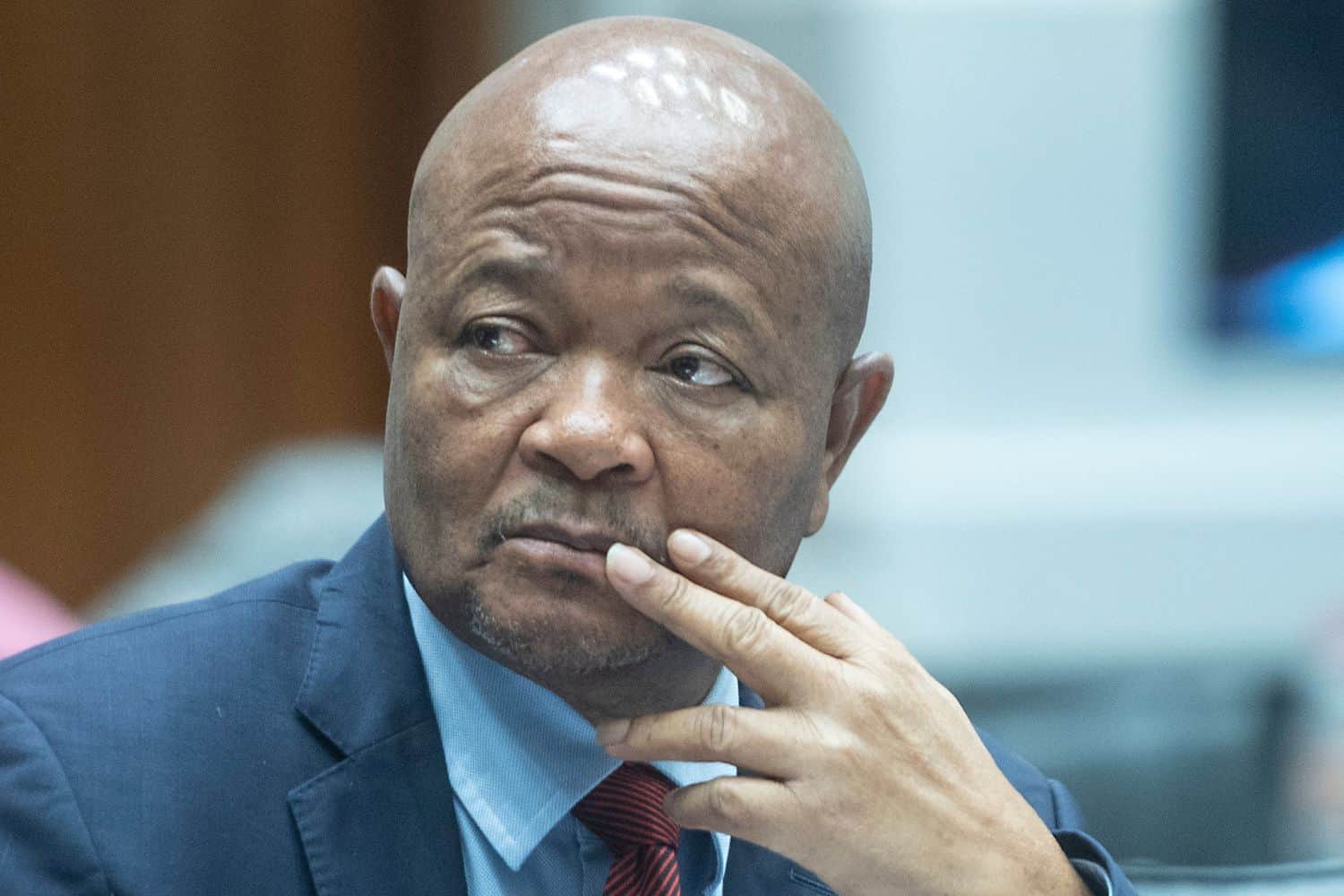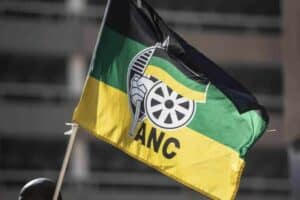The police minister insists he did not disband the political killings task team to protect organised crime.

Police Minister Senzo Mchunu has maintained that he’s no criminal — and says KwaZulu-Natal (KZN) Police Commissioner Nhlanhla Mkhwanazi knows it.
Mchunu appeared before Parliament’s ad hoc committee at the Good Hope Chamber in Cape Town on Thursday, marking his first public response since Mkhwanazi’s explosive media briefing on 6 July.
Mkhwanazi had claimed that Mchunu unilaterally decided to disband the political killings task team (PKTT) to halt investigations into a drug cartel.
Mchunu explains political killings task team disbandment
Testifying under questioning from evidence leader Norman Arendse, Mchunu — who is currently on special leave — reiterated that the PKTT had always been intended as a temporary structure, stating that continuing to fund the task team without justification violated the Public Finance Management Act (PFMA).
He explained that in police practice, when specialised units are created, they are meant to gradually replace temporary task teams such as the PKTT.
“You can’t have both of them and be accountable in terms of public funds,” he said, adding that this didn’t mean that the PKTT wasn’t working or effective.
“They knew that this is temporary. They knew they needed something sustainable… that will cover the whole of the Republic of South Africa, not just KZN,” the minister told the ad hoc committee.
ALSO READ: Masemola withheld information regarding PKTT disbandment, Mchunu tells parliament
Using Saps’ organisational structure to illustrate his point, Mchunu explained that political killings would now fall under the murder and robbery category within the serious and violent crime unit.
He referenced a 2019 work study signed by former national police commissioner Khehla Sithole, which approved the PKTT’s disbandment.
According to the minister, integrating the PKTT into the serious and violent crime unit was revived after the new government took office in July 2024.
“It could have been implemented long ago actually, but there was a delay,” he said.
“Going forward with the taxpayers’ money, you have got to cover all citizens of the country in all provinces, and, therefore, the structure talks to that in a specialised way.
“The only thing that needs to be done is implementation and strengthening.”
Watch the ad hoc committee inquiry below:
‘Your conscience doesn’t give you peace’
Mchunu stressed that as police minister, effective resource allocation is crucial.
“If you keep on funding one unit somewhere in one corner of the country, even if they do well, they are not going to deal with the criminality in the Cape Flats.”
He highlighted that the Cape Flats continues to struggle with crime because the police lack the machinery to combat gangs.
READ MORE: Masemola says Mchunu’s anger over ‘police doing a good job’ was ‘quite strange’
This affected accountability when appearing before Parliament.
“We say we note, but in reality when you go to sleep alone as the minister of police, your conscience doesn’t give you peace because you are aware that you are not doing much on the ground where you are required to do something.
“That’s why we then created a new division in the organogram which is called operations response services.”
While acknowledging the PKTT’s positive impact, Mchunu said one can’t “keep on relegating” the majority of the country’s citizens and focus on politicians and traditional leaders who are killed.
Mchunu’s letter
Mchunu informed MPs that the disbandment decision was discussed in two meetings held in November 2024, attended by National Police Commissioner Fannie Masemola.
He revealed that he personally drafted the 31 December 2024 letter disbanding the PKTT at his home in KZN after reflecting on his five months as police minister.
He also said he watched Mkhwanazi on television struggling to explain that the letter had been written “by people sitting somewhere in a corner”.
“The truth is I sat down in that room alone, and I wrote what ended up being the directives.”
Mchunu insisted he had the constitutional authority to issue directives to the national police commissioner on “policing policy content”.
“I believe I have yet to learn. Would I have given these directives outside the constitution as people believe?”
READ MORE: ‘People are being taken for a ride’: Sibiya accuses Mkhwanazi of misleading SA
He dismissed allegations that the disbandment was intended to protect organised crime.
“It didn’t come from anyone else. It came from me as the minister of police, and I have the capacity to think at that level in my role.
“I may be wrong, or I may be right, but the decision was not for unlawful reasons.
“As a matter of fact, I have nothing to do with criminal syndicates. I have never had anything to do with them in life. It will never happen.”
Mchunu maintained his innocence.
“General Mkhwanazi knows in his conscience that I am not a criminal.”
Mchunu on Brown Mogotsi
Mchunu also confirmed that he knows North West businessman Oupa “Brown” Mogotsi, who was central to Mkhwanazi’s allegations.
“Yes, I know him,” the minister said.
Mkhwanazi had alleged that Mogotsi had insider knowledge of police operations, including the PKTT’s disbandment, and referred to him as Mchunu’s “associate”.
Mchunu denied this but later acknowledged Mogotsi as a “comrade”.
Arendse questioned whether Mchunu was concerned about WhatsApp messages sent by Mogotsi to Vusimuzi “Cat” Matlala, an attempted murder accused and businessman, on 1 January.
The messages claimed Mogotsi would meet with Mchunu and suspended deputy national police commissioner Shadrack Sibiya to discuss the PKTT’s disbandment.
“It would concern me because I wouldn’t know how that could happen,” Mchunu replied.
READ MORE: Sibiya explains how he knows Brown Mogotsi and Cat Matlala
He denied discussing any such meeting with Mogotsi.
“I never spoke to Brown Mogotsi in this period, particularly about the disbandment.
“How he got to know [about the disbandment] and how he got access to the letter is better explained by him, and that will be the only time I get to know how that happened.”
Mchunu said no such meeting ever took place and that he never communicated with Sibiya about one.
He told the committee that he had spoken to his chief of staff, Cedric Nkabinde, about the distribution of the letter.
Nkabinde confirmed to Mchunu that he sent it to Masemola and Tebello Mosikili, the acting national commissioner at the time, as well as their personal assistants.
“I wasn’t expecting that he [Mogotsi] would get a hold of my letter unless it was leaked to social media, as seems to have been the case.”
Ad hoc committee inquiry continues
Arendse will continue leading Mchunu’s evidence on Friday, with committee members scheduled to question the minister on Monday and possibly Tuesday.
Furthermore, former police minister Bheki Cele is expected to testify on 23 and 24 October.
The committee has been granted an extension until 28 November by National Assembly Speaker Thoko Didiza.
Originally, the committee had until 31 October to complete its work, following a National Assembly resolution adopted in July to establish the inquiry.
NOW READ: Madlanga commission: Did Masemola’s testimony sink Mchunu?






